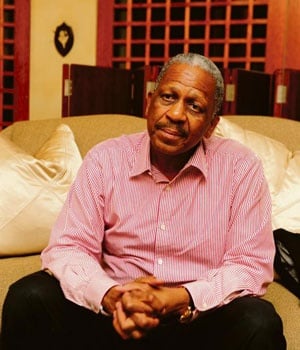
Former ANC treasurer-general Mathews Phosa’s raised profile since the release of his anthology of poetry in June has sparked questions in ANC circles about his political ambitions ahead of the ANC’s 2017 national conference.
He left the big stage in 2012 – when he lost the race for ANC deputy president to Cyril Ramaphosa – but now Phosa’s supporters and detractors are watching for signs of his future intentions.
It is common in the ANC that frequently being in the public eye is viewed as an attempt to build “a path to power”, according to an insider.
In 2017, President Jacob Zuma is expected to step down – although some in the party are pushing to extend his term for another two years in a bid to match the ANC term of office with that of government. Others are opposed to that idea.
Although, in terms of ANC tradition, it should be taken for granted that Ramaphosa will replace Zuma, recent talk about the possibility of a female presidential candidate throws the succession race wide open.
In Phosa’s various appearances on television, radio and in print since the book launch in June, he has commented on current topics, including Nkandla, Marikana, attacks on the judiciary and the media, and a range of political issues affecting Zuma’s administration.
And most of his views have been scathing.
Phosa says he is aware that “insecure” people are closely monitoring his moves, but that would not stop him from promoting his book, Chants of Freedom.
“You cannot avoid these questions, because the journalists will ask you,” he says.
He says he supports the establishment of the ad hoc committee that will look into Police Minister Nkosinathi Nhleko’s Nkandla report, but the committee’s reasons for excluding Public Protector Thuli Madonsela as a witness are “flimsy”.
The ANC majority in the committee has rejected the proposal for Madonsela to testify on the grounds that the committee’s mandate was to discuss Nhleko’s report.
But Phosa says Nhleko’s report “does not hang on its own. It is based on Madonsela’s report. It is an outflow from that and, therefore, if the outflow creates unanswered questions, you have to go back to the source.”
He says that, in law, failure on the part of a lawyer to call a witness would result in an adverse inference.
“If the Public Protector talks nonsense, then we [the public] will know, but on the basis of a transparent hearing,” he says.
He says it would be “interesting to see how Parliament will react to obvious witnesses who had not been called”.
The committee was expected to finalise its report on Friday.
Phosa says he is disturbed by “loose talk” that service providers such as President Zuma’s architect, Minenhle Makhanya, should take the blame for Nkandla.
He says the ministers involved had political oversight responsibilities and must be held accountable.
He says ministers go to Parliament to ask for money when they present their budgets, and when the money is misspent on their watch, they should be held liable.
“It is a culture of impunity that we are creating by looking for scapegoats,” he says.
He says the situation “could only be reversed when we say political heads must take responsibility and take the fall for what happens in their line function”.
He cited as an example former South Korean prime minister Chung Hong-won, who last year stepped down after taking responsibility for the government’s slow response to a ferry accident that left close to 200 dead and many others missing.
Phosa says the prime minister “stepped down because of the moral responsibility, and not because he was driving the ship”.
“It is not just a legal thing. There is ethics about it and there is morality about it. It is about responsibility,” he says.
He feels that national police commissioner General Riah Phiyega does not have to be legally convicted for her to say whether she takes responsibility for the 2012 police shootings in Marikana.
“The legal conviction is not a test for accountability. It goes beyond that,” says Phosa.
He adds that President Zuma must take the lead in reversing the problem of political heads being made immune to accountability: “He must tell his Cabinet that they will fall on their swords when they mess up.”
However, Phosa is also optimistic that the ANC will “self-correct”, and government will benefit from that.
“It is a self-corrective organisation and it has never allowed itself to die in its own shoes with what is wrong,” he says.
“It is like an ocean. It rejects what it does not want at the end. It is very intolerant of what is does not want. In time, it will do that. It may take time. It may walk slowly like an elephant, but it is very self-corrective,” says Phosa.
About his own political ambitions, Phosa explains: “I still enjoy my business life. My late mother always said I look so relaxed and so reflective when I am out of politics.”




 Publications
Publications
 Partners
Partners








